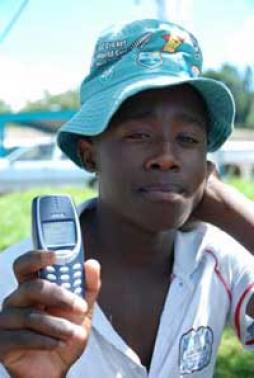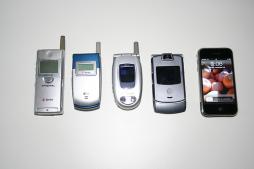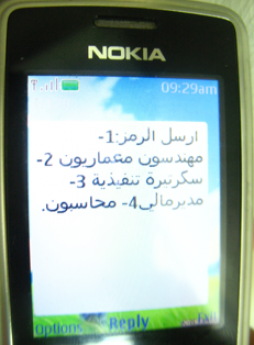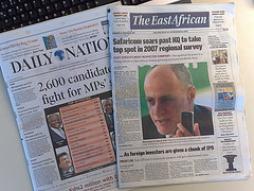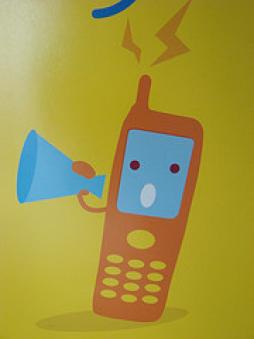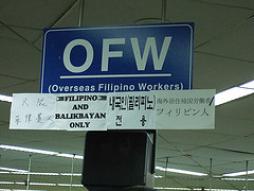sms
Posted by KatrinVerclas on Dec 07, 2008
The CODEO Election Observation Center for the all-important 2008 Ghanaian election is a busy place. Data operators are sitting on rows of computers monitoring incoming SMS messages from 1,000 polling stations around the country. Mobile phones are ringing constantly with calls from the observers in the field. Maps of the 230 constituencies in Ghana adorn the walls of the modern building at the Kofi Annan International Peacekeeping Training Center in Accra.
The Observation Center, affectionately called the "OC" by CODEO staffers, is the technology hub of the massive amounts of qualitative and vote count data that is pouring in from the more than 4,000 election observers deployed by CODEO, the Coalition of Domestic Election Observers. This makes it by far the largest deployment of election observers in this year's election. Mobile technology, and text messaging in particular, is playing a critical piece in relaying both qualitative data on how the election is being conducted, and quantitative data that will verify the official results issued by the Ghanaian Election Commission.
Posted by KatrinVerclas on Dec 01, 2008
Today is World Aids Day, a day where individuals and organisations from around the world come together to bring attention to the global AIDS epidemic.
Mobile phones are increasinly playing a key role in combatting HIV/AIDS, providing public education and information services, patient monitoring and support, data collection, emergency medical services, and even educational games.
We have written much on this topic, of immense importance to the world where there are now more than 33 million people living with the disease, making it one of the most destructive epidemics in recorded history. Throughout the day, we'll feature a few projects that use or have used mobile technology in HIV/AIDS prevention and treatment that stand out.
Posted by KatrinVerclas on Nov 22, 2008
Local information and media is one of the areas where mobiles can be an ideal delivery vehicle. Rede Jovem, a Brazilian NGO created 0800 Rede Jovem, or Mobile YouthNet, a project that reaches young people through SMS on their mobile phones with local opportunities and information about what is going on in their communities. Soledad Muniz talked with Alice Gismonti from Rede Jovem about the SMS project.
Posted by KatrinVerclas on Nov 16, 2008
Google Labs in India recenty launched SMS Channels, a new, free SMS messaging service for India only that may prove to be incredibly useful for citizen groups and NGOs. The service allows anyone to set up a group of mobile subscribers to message to, or for a group to message each other many-to-many. A user can receive news alerts and blog updates via SMS, for example; or a group can group-text message to each other.
There are many commercial group messaging solutions in India where the primary means of mobile communiations is SMS. However, unlike GupShup, Zook, and MyToday, Google’s SMS channel is two-way allowing for SMS discussions and also enabling subscribers to publish to the channel.
Posted by KatrinVerclas on Nov 10, 2008
The National Council of Resistance of Iran reported recently that SMS use in Iran is now regulated. According to the article, the Organization of Communications Regulations in Iran has imposed restrictions on sending SMS, requiring a security check by the Ministry of Intelligence and Security (MOIS) to receive clearance for using the service.
The article details the regulation: "Sending SMS deemed contrary to national security will be punishable by law. Any change of address by the subscriber of the service must be reported promptly to the relevant authorities. It is the security agents who decide which SMS are in breach of national security." The article further states that "according to some figures every day over 20 million text messages are received in Iran, the peak hours are between ten in the evening and one in the morning. The SMS has become a tool to exchange messages by opponents of the regime."
Posted by on Jan 01, 1970
n/a
Posted by CorinneRamey on Jul 22, 2008
A few weeks ago, audience members at a New York Philharmonic concert in New York City's Central Park voted for the encore. Given two options -- Jimi Hendrix's "Purple Haze" and Rimsky-Korsakov's "Flight of the Bumblebee," the audience members texted in their votes. About 74% of respondents voted for Hendrix, so that piece concluded the concert.
Vince Ford, the Philharmonic's Director of New Media, told MobileActive a bit about the orchestra's first steps into mobile marketing. "We have offered ringtones on our website for two years now, but beyond that we haven't done much with mobile," Ford said. "This week was our first step in that direction." In addition to the SMS voting, the orchestra offered concert status SMS alerts on their website. "Not many people signed up initially, but once it rained on Monday the alerts really took off," he said. Ford said that 5,000 people participated in the concert alerts or SMS voting. About 61,000 people attended the outdoor concert.
Posted by KatrinVerclas on Jul 15, 2008
By Bruce Girard, reposted with permission.
At first glance SMS text messages would seem like a natural for inclusion in a community radio station’s essential toolkit. SMS messages are inexpensive and easy-to-use and in recent years the mobile phones that are needed for sending and receiving them have become ubiquitous. However, an informal survey of recent projects indicates that use of SMS messages among community media in the developing world is still at an early stage. In most stations SMS use is informal. The few cases identified of community stations making more complex use of SMS messages have accompanied political crises or natural disasters and have inevitably been donor financed. There are few, if any, experiences of complex uses of SMS by community media without external funding and technical support, even though the financial and technical resources required are minimal.
Posted by CorinneRamey on Jul 11, 2008
In 2007, Sierra Leone had its first election since the end of a 10-year civil war. Previous elections had been run by the United Nations (UN), and there was fear that these highly contested elections would not be run fairly and transparently under the Sierra Leone National Election Commission (NEC).
Faced with the challenge of monitoring elections in a country that lacks infrastructure and reliable Internet access to transmit election data by conventional means, the monitoring group National Election Watch, abbrviated NEW, used a unique tool to transmit election data: SMS. (MobileActive.org had written prevoiously about this election and the role of SMS - see Texting It In: Monitoring Elections With Mobile Phones)
Posted by CorinneRamey on Jul 09, 2008
The news is coming. Or at least that's what Guy Berger titled his Knight News Challenge project, which aims to connect diverse populations in Grahamstown, South Africa to news through mobile phone- based citizen journalism and news delivery. Berger, head of the School of Journalism and Media Studies at Rhodes University was recently awarded a Knight News Challenge grant, which funds "digital information innovations that transform community life."
Berger talked with MobileActive about the project. "This is hyperlocal," he said. "It is to expand the town square of Grahamstown in terms of information and opinion flows." The "citizen journalists" will be high school students. In August, Berger's group will conduct workshops with 80 students separated into classes of 20. Each class will have two Saturday workshops about what it means to be a citizen journalist. The students will then submit news stories via SMS.
Posted by on Jan 01, 1970
n/a
Posted by KatrinVerclas on Jun 30, 2008
Mobile social marketing works in increasing awareness and moving people to actions. It is also becoming an effective way to engage users and constituents. Throughout our experience with mobile campaigns, we've run into the some great campaigns and some failures as well. In our ongoing series of articles and case studies on using mobiles for advocating for an issue and engaging a constituency, here are our top ten things that nonprofits should and shouldn't do when running a mobile advocacy campaign.
The DOs of Mobile Advocacy
Posted by CorinneRamey on Jun 27, 2008
Curious how your state ranks on reproductive choice? NARAL Pro-Choice America makes it easy to find out. By texting the word "grade" and the abbreviation of your state to a short code, you get an almost-instantaneous text response with your state's grade and opportunities for more information. "One of the reasons we decided to invest in mobile technology is we want to diversify how we're communicating with people," said Kristin Koch, Deputy Director of Communications at NARAL. NARAL recently began a mobile program -- they're calling it Txt4Choice -- and has been exploring how to use mobile in ways that compliment and integrate into their already developed communications strategy.
Posted by CorinneRamey on Jun 27, 2008
Note: This primer was written for the NTEN newsletter, targeted at a US audience and thus focuses on America. For more on mobile advocacy in many other parts of the world, see here.
Posted by CorinneRamey on Jun 25, 2008
Note: This primer was written for the NTEN newsletter, targeted at a US audience and thus focuses on America. For more on mobile advocacy in many other parts of the world, see here.
Mobile phones are more prevalent in the U.S. than ever before. Today, over 86% of the US population ages 13 and up owns a mobile phone. Although Americans say that the mobile phone is the device that they hate the most (it even beats the alarm clock and the television!), the cell phone is here to stay. In the past decade, mobile users have grown from about 34 million to more than 203 million, and growth is expected to continue to increase exponentially.
Posted by CorinneRamey on Jun 23, 2008
MobileActive releases the newest addition to our growing resource hub: Mobile Phones for Polling and Engagement.
Polling via SMS can be a unique way to engage current supporters and attract new audiences. Polls can ask any number of questions, from opinions about an organization to views on a controversial issue. However, perhaps the most valuable aspect of polling isn’t the feedback that organizations receive directly from a poll, but rather the relationships with constituents and growing mobile support base that polls can help build.
Organizations engage in mobile polling for two reasons:
- to generate a list of mobile numbers to use for future communications and engagement
- to get an informal sense of constituent views for use on an organization's web site, for generating media coverage, and learn more about a particular segment of its constituency.
Mobile Phones for Polling and Engagement includes a case study of polls conducted by Media Focus on Africa (MFAF) as part of their Election Assistance Campaign, which sought to promote civic participation and discussion of political issues prior to the December 2007 Kenyan elections. Through SMS polling, MFAF asked its constituents some tough questions.
Should politicians accused of corruption be prevented from vying for political seats? Is tribal identity more dominant than the identity of being a Kenyan? Can voting still deliver credible results after the chaotic party nominations and bribery?
The questions were advertised on television, radio shows, and newspaper advertisements. Thousands of Kenyans responded to the polls via SMS on their mobile phones, helping to bring issues of voting and civic participation into the national conversation.
Posted by CorinneRamey on Jun 09, 2008
Getting information in the West Bank in Palestine can be difficult. Public transportation is fragmented and some 500 checkpoints around the area make travel time-consuming and difficult. Most people don't have regular Internet access, and newspapers are expensive. A project called Souktel has stepped in to fill this information gap. The service, launched in 2006, uses SMS to connect users to two services: job opportunities and humanitarian aid. The name comes from "souk," the Arabic word for "marketplace," and "tel," or "telephone."
Jacob Korenblum, co-founder of Souktel, talked with MobileActive about the project. "At least 80% of people in the West Bank have cellphones, but Internet access is a problem for people here," Korenblum said. "So getting information about medical care, jobs, and food bank services can be difficult." Although there are Internet cafes, Korenblum said that many people, especially women, lack access to these services. "We wanted to develop a very simple service," Korenblum said.
Posted by CorinneRamey on May 31, 2008
Dr. Joel Selanikio believes in the value of the news. "It's one of my core beliefs that the more people know, the better decisions people are going to make," he said. Selanikio, the director of DataDyne.org, was recently awarded a Knight News Challenge grant for a project that distributes news on mobile phones.
Selanikio sat down with MobileActive for a discussion about his project. Selanikio isn't new to mobile phones. As director of DataDyne.org, he has used mobile phones for data collection with EpiSurveyor (read more about this in Wireless for Social Change: Trends in NGO Mobile Use.) He is also part of a consortium on mobile data collection, OpenROSA.
Posted by on Jan 01, 1970
n/a
Posted by KatrinVerclas on Apr 05, 2008
I recently had a chat with Patrick Meier, a doctoral student at Tufts University, and am thrilled to have started a conversation. Patrick is doing his dissertation on what he calls the "iRevolution," activism, repressive regimes and who is winning in the cat and mouse tech game. (And yes, I am paraphrasing!) He generously allowed us to repost one of his pieces on secure SMS and a mobile equivalent to TOR. We'll be in close touch with Patrick as he delves into the research - it's much needed and great work.
By Patrick Meier
WirelessWeek: Analysts predicted SMS revenues of up to $80 billion worldwide in 2007, with the number of text messages expected to reach a whopping 1.8 trillion by 2010.
Posted by CorinneRamey on Feb 22, 2008
MobileActive releases the first-ever comparison of do-it-yourself SMS campaign tools, designed especially for NGOs. The Guide helps NGOs get started in setting up a SMS campaign and includes a comparison of different SMS campaign software.
Over the last several years, it’s become clear that mobile phones are becoming one of the most influential devices in our social, political, and civic lives. Savvy nonprofit organizations and NGOs are experimenting with using mobile phones as persuasive devices to recruit new supporters, organize groups, and advocate for causes.
Thus far, most of the successful mobile-phone campaigns have relied on text messaging as their persuasive technology of choice. It’s the only mobile phone technology that works reliably across the majority of mobile phones in most countries. In addition, most people in most countries are familiar with text messaging.
Posted by CorinneRamey on Feb 22, 2008
MobileActives in New York! If you read about the folks who organized the Zumbido project which connects people living with HIV/AIDS through an SMS network, come meet them this Friday, February 22 at 5 p.m. We'll meet at the Park Bar, located at 15 E. 15th Street. Click here for a map.
See you there!
Posted by CorinneRamey on Feb 17, 2008
Limbo, a mobile marketing company, provided three of the U.S. presidential candidates with free mobile advertising. The goal was to measure how voting intentions and perceptions change with SMS advertising.
The results were surprising, Limbo's Chief Marketing Officer Rob Lawson told MobileActive. SMS advertising changed the "voting intentions" of 28% of the people who received the messages and about 14% of recipients said they viewed the candidates more positively after the campaign. "I was surprised by the impact on voting intention," said Lawson. "I thought people would be comfortable receiving them, but I didn't think it would cause them to pay more attention to the candidates."
Posted by CorinneRamey on Feb 14, 2008
A single computer, hooked up to a modem in Bobby Soriano's house in the Philippines, receives a steady of stream of text messages begging for help. There have been messages from Philippine seamen, who, after being accused of the murder of a Korean captain, were forced to confess by Omani police. There was a Philippine domestic worker in Lebanon who was forced to flee to the mountains to escape Israeli bombings, and a message from twenty Philippine sailors who were evicted from their ship by police near Denmark. In each of these cases, a single SMS message with the keyword "SOS" was sent to a hotline in the Philippines, activating a network of nonprofits and government agencies to come to the workers' rescue.

